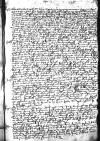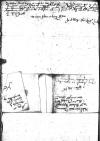Quod ad Vestram Excellentiam, mi optime pater et benefactor, in tot mensibus nihil scripserim, me excusatum habere velit, plurimum rogo. Quoniam priusquam me ad ⌊Brabantiam⌋ contulissem, intellexerat sacratissimus ⌊rex meus⌋ ex diversis litteris adventum meum et ex urgente quadam necessitate misit mihi obviam nuntium quemdam per postam, qui me in itinere convenit, at ego dimissis familiaribus et equis postam ascendi et regem meum iam a Brabantia absolutum ⌊Berlinium⌋ apud illustrissimum dominum Ioachimum marchionem Brandeburgensem, principem electorem eius sororium repperi. Qui causam ob quam misisset obviam et alia sua secretiora (quae nemini praeter me, ut inquit c)redere voluit) manifestan(do), statim me per diversa loca et diversos principes destinavit ita, ut iam primum ad paucos dies hic revocatus expeditis quasi negotiis ad ⌊illius maiestatem⌋ revertar, etsi maiestas sua infra istum et sequentem menses ad sua regna non redierit, ⌊Mechliniam⌋ petam ibidem remansurus apud principem iuniorem donec Deus nobis fortunam immutaverit. Sed quantum in humano ingenio est, video ⌊regem meum⌋ iam amplius exulari non posse. Quoniam tanta est inter hostes ⌊suae maiestatis⌋ differentia et subditorum benevolentia et affectus erga regem meum, ut si etiam velit amplius exulari nequeat. Et quamvis res ista est in optima dispositione, nolo tamen scribere, nisi perventum fuerit ad optatum portum. Nam res ista ⌊Thurci⌋ cum ⌊Hungaris⌋ et ⌊Australlibus⌋ multum nobis obstat.
Ceterum, qualiter serenissimus ⌊rex Poloniae⌋ ⌊Gedanenses⌋ tam Christiane ad veram religionem compulerit, non dubito Vestram Excellentiam ab illius maiestate et suis iamdudum intellexisse. ⌊Ille⌋ autem, qui crucem abiecit, non est (ut audio) cum illius maiestate in aliqua existimatione. Immo nisi semel aut bis ad ⌊eius maiestatis⌋ praesentiam admissus et tum rex cum indignatione dixisset illi: „Habuimus informationem de te quemadmodum ⌊caesarea maiestas⌋ et ⌊summus pontifex⌋ praestitissent consensum, ut ordinem et religionem illam dimitteres. Nunc autem secus per litteras ⌊illius maiestatis⌋ et ⌊sanctitatis suae⌋ informati sumus et ostendit litteras utriusque dicens, sicuti ex his plane intelligere poteris. Quapropter non est tibi sperandum aliquod praesidium de nobis neque intendimus te contra illos in aliquo tueri.” Et alia sunt in fabrica contra eum. In omnibus fiat voluntas Domini. Hesterna nocte venit huc quidam nobilis ex ⌊Cracovia⌋, qui dixit se vidisse quemadmodum ⌊rex Poloniae⌋ fecit proceres et magnates regni et aliquos proconsules plusquam XVI aut XVII numero ⌊Cracoviae⌋ publice decollari et tandem ⌊Cracovienses⌋ insurrexisse contra eorum regem et regem aufugisse a Cracovia ad ⌊Petterkow⌋. Ipsique ⌊Cracovienses⌋ cotidie contra ⌊eorum regem⌋ intertenere tres milia peditum Germanorum, quod profecto invitissime audivi. Addidit etiam ⌊Tartarum⌋ fecisse incursionem in regno tamen illum fuisse egregie expeditum a ⌊Polonis⌋ et rediisse ad Tartarium.
In conventu principum ⌊Spirae⌋ habito nihil penitus conclusum est pro ⌊caesarea maiestate⌋, sed conventum est, ut contra ⌊Thurcas⌋ intertenebunt decem milia peditum cotidie, dubito ne venirent in tempore. Quoniam iam ⌊Thurca⌋ evicit illum pauperrimum regem Hungariae, qui aufugiendo in palude cum duobus episcopis interemptus est et Thurca interfecit omnem exercitum regis, insequitur etiam reginam, quae volens confugere ad ⌊Viennam⌋. Consilio consiliariorum archiducatus Austriae dimissa ⌊Buda⌋ confugit ad ⌊Presburg⌋, ubi facta munitione et pensione de virtualibus et aliis necessariis adiunxerint per illius custodire tres milia peditum Germanorum, dico 3000. Comes Ioannes de Hardeck ad mortem usque vulneratus est et pervenit ⌊Viennam⌋. Dicunt eum tamen mortem non evasurum ex vulnere. Quod ego discordiam atque invidiam principum Germaniae transcribam, superfluum censeo, quoniam Excellentia Vestra de ea re in curia ⌊caesareae maiestatis⌋ plenissimam habet sequenti de singulis informationem.
Magnifice Domine benefactor et pater optime, Deus Optimus Maximus vestram Excellentiam diu faustam atque felicem praeservare ac ex illa miserrima ⌊Hispania⌋ cum celerrima et optata expeditione suorum negotiorum eripere nosque mutuo sanos coniungere dignetur, ut denuo pro tantis beneficiis in me collatis, si non debitas, saltem ex animo gratias immortales illi agere possem. O(ptimus) utinam Deus eam mihi gratiam in hac vita tribueret, ut tantorum beneficiorum me gratum exhibere, valerem erga eandem Vestram Excellentiam, cui me perpetuo devotissime commendo dedo atque subicio.
⌊Ysope⌋ ex intimis praecordiis necnon dominum ⌊Fabianum⌋, ⌊Petrum⌋, ⌊Guidonem⌋, Britannum, Polonum, Ioannem Didacum vel Degettum, adusque Symeam et imprimis dignissimum ⌊Stanislaum⌋ meo nomine consalutari plurimum opto, atque ut Vestra Excellentia mea gratia donet die praesentationem istarum Stanislao facultatem ebibendi ciatum illum Tolletanum plenum vino optimo atque purissimo sine aliqua poena lardi, picis, sulphuris, tracte corde sumpsionis omni sincero etc.
 AAWO, AB, D. 66, f. 138v
Condoleo illius boni et nobilis viri ⌊Segismundi de Thurrer⌋, qui in sua senectute privatur omnibus ab impiissimo communi hoste acerrimo. Qui tum in dominiis archiducis/archiducatus impiissime procedit. Nam omnes utriusque sexus homines [...] hidden by binding⌈[...][...] hidden by binding⌉ ac etiam infantulos interficit nemini parcens neque unum dimittens.
AAWO, AB, D. 66, f. 138v
Condoleo illius boni et nobilis viri ⌊Segismundi de Thurrer⌋, qui in sua senectute privatur omnibus ab impiissimo communi hoste acerrimo. Qui tum in dominiis archiducis/archiducatus impiissime procedit. Nam omnes utriusque sexus homines [...] hidden by binding⌈[...][...] hidden by binding⌉ ac etiam infantulos interficit nemini parcens neque unum dimittens.
 AAWO, AB, D. 66, f. 138v
Condoleo illius boni et nobilis viri
AAWO, AB, D. 66, f. 138v
Condoleo illius boni et nobilis viri 
